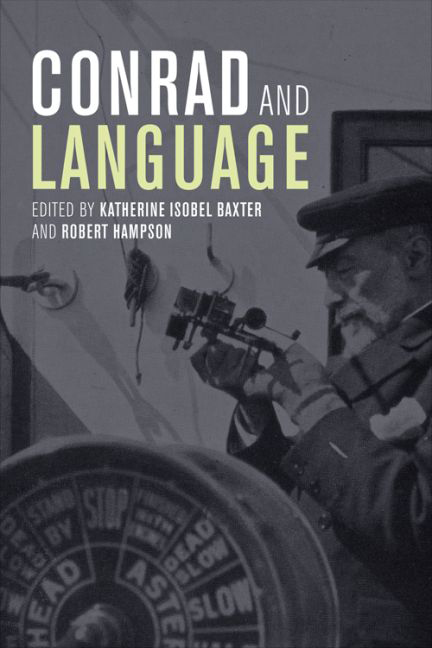Book contents
- Frontmatter
- Contents
- A Note on Texts
- Introduction
- 1 Conrad and Nautical Language: Flying Moors and Crimson Barometers
- 2 Navigating the ‘Terroristic Wilderness’: Conrad's Language of Terror
- 3 Conrad, G. E. Moore and Idealism
- 4 Conrad's Language of Passivity: Unmoving towards Late Modernism
- 5 The Powers of Speech in Conrad's Fiction
- 6 ‘Soundless as Shadows’: Language and Disability in the Political Novels
- 7 Conrad and Romanised Print Form: From Tuan Almayer to ‘Prince Roman’
- 8 Languages in Conrad's Malay Fiction
- 9 Gallicisms: The Secret Agent in Conrad's Prose
- 10 ‘The speech of my secret choice’: Language and Authorial Identity in A Personal Record
- 11 The Russian Redemption of The Secret Agent and Under Western Eyes
- Afterword
- Contributors
- Index
Introduction
Published online by Cambridge University Press: 12 September 2017
- Frontmatter
- Contents
- A Note on Texts
- Introduction
- 1 Conrad and Nautical Language: Flying Moors and Crimson Barometers
- 2 Navigating the ‘Terroristic Wilderness’: Conrad's Language of Terror
- 3 Conrad, G. E. Moore and Idealism
- 4 Conrad's Language of Passivity: Unmoving towards Late Modernism
- 5 The Powers of Speech in Conrad's Fiction
- 6 ‘Soundless as Shadows’: Language and Disability in the Political Novels
- 7 Conrad and Romanised Print Form: From Tuan Almayer to ‘Prince Roman’
- 8 Languages in Conrad's Malay Fiction
- 9 Gallicisms: The Secret Agent in Conrad's Prose
- 10 ‘The speech of my secret choice’: Language and Authorial Identity in A Personal Record
- 11 The Russian Redemption of The Secret Agent and Under Western Eyes
- Afterword
- Contributors
- Index
Summary
Conrad was born in Berdychiv in 1857. Berdychiv, a city and district now in Ukraine, at that time had a population consisting of Ukrainian peasantry and Polish landowners, and a large Jewish community, all legally subjects of the tsar of all the Russias. Conrad's family were szlachta, members of the Polish gentry, and like other members of his class, Conrad learned French early. In 1862, his parents (along with the four-year-old Conrad) were exiled to a penal colony in Vologda, 300 miles north-east of Moscow, for their political activities. The following year, the family was allowed to move south to the less harsh conditions of Chernikov, near Kiev, and Conrad and his mother were granted three months’ leave for medical treatment. They spent the summer with her family at Nowochastow, where, as A Personal Record suggests, Conrad seems to have had his first lessons in French. At this time, Poland, as such, didn't exist: it had been divided, by the Partitions of 1792, 1793 and 1795, between Russia, Prussia and Austria. Until he was naturalised as a British subject and released from his Russian subjecthood in 1886, Conrad travelled on Russian travel documents. In 1865 his mother died, and, in 1867, Conrad and his father, Apollo Korzeniowski, were allowed to move to the Austrian-held part of Poland. In 1869, shortly before his father's death, they moved to Krakow, where Conrad was to stay until 1874. His childhood was thus divided between Russiancontrolled Poland and Austrian-controlled Poland.
In October 1874, at the age of sixteen, Conrad left Poland and travelled to Marseilles, where he was based for the next four years, sailing on French merchant ships. His travels at this stage took him to the Caribbean and, possibly, to South America. In 1878, he joined the British steamer the Mavis, and made his first sustained contact with English people and the English language. After this, he joined the British Merchant Navy, based himself in London, and began to learn English. His sea-voyages also brought him into contact with other languages.
- Type
- Chapter
- Information
- Conrad and Language , pp. 1 - 9Publisher: Edinburgh University PressPrint publication year: 2016



